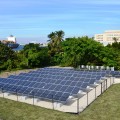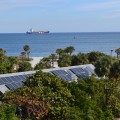NSU Newsroom
SharkBytes
Horizons
This version of NSU News has been archived as of February 28, 2019. To search through archived articles, visit nova.edu/search. To access the new version of NSU News, visit news.nova.edu.
This version of SharkBytes has been archived as of February 28, 2019. To search through archived articles, visit nova.edu/search. To access the new version of SharkBytes, visit sharkbytes.nova.edu.
NSU Launches Sustainable Solar Energy Project at John U Lloyd Beach State Park
Nova Southeastern University (NSU) has completed a solar energy project that provides John U. Lloyd Beach State Park with 100 percent of its energy needs through a combination of solar electric and solar hot water systems. Known as the Sustainable Energy Project, the initiative combines using energy efficiency and renewable energy technologies to provide all of the park’s energy needs, while generating environmental and economic benefits for the park as well.
The project works in two steps:
1) John U. Lloyd’s air conditioning and lighting were upgraded to high efficiency equipment, which is projected to reduce the park’s energy use by as much as 30 percent.
2) Solar electric systems were installed at four locations (park entrance, administration and maintenance buildings, and concession stands) to produce enough energy for the park to use annually. Solar domestic hot water systems were also installed to provide hot water for the rangers who reside at John U. Lloyd.
NSU funded the design, equipment, and installation of the project. The solar electric system has a 25-year plus life expectancy. The array of solar electric panels provides electricity to power the park’s lights, facilities, and computers. In fact, the solar electric system is utility interactive, which means that excess energy the park produces is returned to the Florida Power & Light Company (FPL) grid. That energy is then used to power the park at night and on cloudy days.
NSU launched the Sustainable Energy Project as part of the university’s “Go Green” movement and in consideration for the lease use of 2.3 acres of state-owned land adjacent to its Center for Excellence for Coral Reef Ecosystems Science Research Facility. This $40-million project, which is expected to be completed this Spring, will create America’s largest coral reef research center. The state land is needed for access to the facility. A major portion of this land will be available for parking for John U. Lloyd Beach State Park patrons during periods of high-demand use.
The coral reef center is a part of NSU’s Oceanographic Center (OC), the university’s school of oceanography and marine biology, which sits at the northern tip of John U. Lloyd. “This is a win-win situation for both NSU and the park,” said Richard E. Dodge, Ph.D., the OC’s dean. “The state is helping us with our world-class research facility, while we are helping the park become 100 percent energy balanced.”
Bill Gallo, the project’s architect and chairman of the OC’s Dean’s Development Council, an advisory board for Dean Dodge, said the Zero Energy Project will be a model for other state parks to follow. “The state of Florida’s park system will now have a model facility that’s a zero energy consumer,” said Gallo, whose architectural and construction companies designed and built the solar electric system. “The planet benefits from less CO2 emissions, less barrels of oil consumed, and fewer trees felled. And the state benefits by generating its own energy for consumption.”
Gallo said this project can help make Florida a world leader in alternative energy systems for running public facilities. Officials from the Florida Department of Environmental Protection, which runs the state parks system, said there are only a few state parks that generate their own power with a grid-tied or generator backup system.
The John U. Lloyd solar electric system is the first self-sustaining energy system of its kind within the state park system, Dodge said. “Seeing the project concept we developed become a reality is rewarding in terms of the benefits to the John U. Lloyd Beach State Beach Park and NSU, including progress towards a sustainable economy for the State of Florida,” said Nikolas Camejo, president of Sustainable Economic Development Group, LLC, which designed the system.

